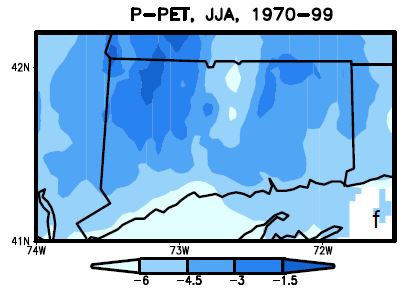Project Summary
Planning for adaptation requires localized information about expected changes in climate. Until recently, the spatial scale of climate projections did not allow for detailed regional analysis. For this reason, climate assessments have been performed on global and national scales, with limited regional information. While national and international climate assessments generate cutting edge consensus-based scientific summaries, this information often falls short of being usable for decision-making at the local level. State-level climate assessments aim to align the scale of information to support local decision-making.
UConn researchers reviewed the current state of knowledge of the physical science for observed and projected climate trends and extremes in Connecticut. The result is a report, Connecticut Physical Climate Science Assessment Report (CT-PCSAR). The purpose of this report is to provide an assessment of the state of the science regarding observed changes and projections for temperature and precipitation (i.e., physical climate). All projections analyzed for this assessment use the high CO2 emissions scenario (RCP8.5) and there is high confidence in projected changes through 2050. Actual temperature and precipitation changes, particularly after mid-century, will depend on mitigation actions taken in Connecticut and globally. Key findings from this assessment include:
- Significant increase in average annual temperatures, with largest increase expected in summer and in fall.
- Increase in heat waves - currently warm spells occur 4 times a year - in 2050, they will occur 8 times a year.
- Fewer frost days - 124 days presently will decrease 39 days by 2050.
- Growing season expected to increase approximately 35 days by 2050.
- Increase of annual precipitation with the largest increase expected in winter and spring. Results in fall and summer are inconclusive.
- Number of heavy rain days is projected to increase, increasing flood risk.
- Decrease in summer water availability (with greater evapotranspiration), which is expected to increase drought risk.
The Connecticut Institute for Resilience and Climate Adaptation (CIRCA) at UConn with funding from the Department of Energy and Environmental Protection (DEEP) commissioned this report to foster dialogue about the changing climate between experts in physical climate and state/municipal/community groups involved in planning and adaptation to these changes in Connecticut.
Product
Connecticut Physical Climate Science Assessment Report-Aug 2019
Connecticut Physical Climate Science Assessment Report-Appendix
Project Team Members
- Anji Seth, UConn Department of Geography
- Scott Stephenson, UConn Department of Geography
- Guiling Wang, UConn Department of Civil & Environmental Engineering
- Christine Kirchhoff, UConn Department of Civil & Environmental Engineering
- Richard Anyah, , UConn Department of Natural Resources and the Environment
- Kelly Lombardo, UConn Department of Marine Sciences

Topic Areas
This project is a part of the following topical areas: